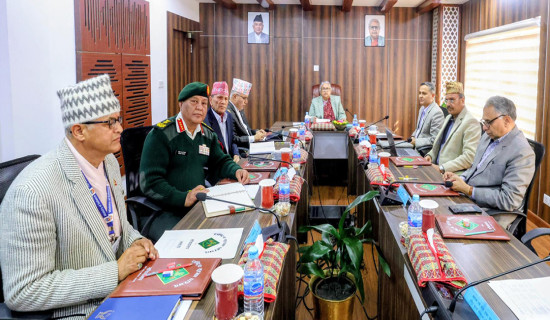- Wednesday, 4 March 2026
Opposition Takes Centre Stage
Opposition parties have recently disrupted the winter session of parliament, known as the House of Representatives (HoR), asking that the government act against three ministers whom they accuse of abusing their positions. The opposition parties appear to have grabbed attention during the current House proceedings and have held the chamber at their mercy, as both the opposition and ruling benches engaged in verbal sparring and exchanged charges and counter charges over some recent happenings.
The three opposition parties — the CPN-UML, Rastriya Swatantra Party (RPP), and Rastriya Prajatantra Party (RSP) — have demanded that Physical Infrastructure Minister Prakash Jwala, Health and Population Minister Mohan Basnet and Tourism, Culture, and Civil Aviation Minister Sudan Kirati resign due to their controversial actions. However, Prime Minister Pushpa Kamal Dahal Prachanda is yet to respond to the opposition's demand to remove these ministers, most likely because doing so would have an impact on the general fabric of the existing coalition government. The opposition claimed that the Prime Minister ran away from facing them.
Accusations
KP Sharma Oli, main opposition leader, joined the opposition demand and called on all three accused ministers to quit so that House procedures may resume normally. According to opposition legislators, the three ministers in question have faced different accusations. Minister Jwala has been accused of contributing to the escalation of the unrest near the foreign employment department in Bal Kumari, Lalitpur, where frustrated and angry youths gathered on December 29, 2023, demanding they be allowed to take a Korean language examination in order to work as migrant workers in South Korea. The unexpected and undesired arrival of Minister Jwala further enraged the angry mob, resulting in the torching of the minister's official vehicle, spurring police to use excessive force and open fire, killing two youths.
A committee appointed to investigate the Bal Kumari incident accused the minister of inciting violence by arriving at the scene in his vehicle. The opposition parties also accused the Home Ministry of neglecting to instruct police personnel who fired on agitated youngsters to exhibit greater restraint at the scene of the incident. The opposition claims that the Home Minister has also been exposed in the Bal Kumari incident. Similarly, Health Minister Basnet has been accused of corruption while purchasing Teramax technology for Nepal Telecom when he was Minister of Information and Communication Technology a few years back. Minister Basnet went to the anti-graft body, CIAA, a few weeks ago to provide his response after evading questions for several weeks. He has yet to be charged formally.
Likewise, Minister Kirati, who is notorious for engaging in contentious acts that some call political stunts, has been accused of leasing the historical Buddhist site of Ram Gram in West Nawalparasi to a private corporation for 99 years at a low cost. The newly appointed Lumbini Development Trust Chair, Lhyarkal Lama, a controversial figure, moved on behalf of the minister to lease the area, drawing criticism from villagers, the media, and the public, prompting the opposition to demand Kirati's resignation. It should be noted that the three key ministers represent three different political parties in the current coalition government. Minister Basnet represents the Nepali Congress, Kirati the Maoist Centre, and Jwala the Unified Socialist.
It would be difficult, if not impossible, for the head of a five-party coalition government to take action against any coalition ministers without first engaging alliance partners. It appears that the current structure of the government prevents the Prime Minister from taking action against erring ministers. Meanwhile, Prime Minister Prachanda, who is now seen expressing his desire to clear up the existing mess in the government, has found himself in a tough position in dealing with ministers whose ministries are either non-performing or under-performing.
The Prime Minister is also unhappy with some Nepali Congress ministers, whom he accuses of ignoring crucial decisions that affect the government's overall image. The Finance Minister decided a few weeks ago to reduce the size of the national budget from Rs. 1.7 trillion to Rs. 1.5 trillion after his ministry failed to collect revenues as projected in the national budget he proposed for the current fiscal year. According to reports, Prime Minister Prachanda was displeased with the Finance Minister's decision to reduce the budget amount without consulting the government head.
These occurrences are some of the irritants that have made the major leaders concerned about the ongoing coalition culture. The recent decision by the Nepali Congress Mahasamiti not to seek a pre-poll coalition as it prepares to contest the upcoming general election in 2027 has probably sent a message to the rest of the coalition partners that they will not have the support of the largest party in the current parliament when they face the next elections, which may lead them to look elsewhere.
Strained relations
It is worth noting that whenever the Maoist Centre chair and PM Prachanda find himself in trouble, he wants to negotiate with the main opposition chair, Oli, with whom he has had strained relations in recent years. Given the current size of parliament, the PM sees the UML as a safe bet for sending a underlying 'message' to other coalition members, particularly the Nepali Congress, whose president Deuba is vying for the position of future Prime Minister as per the gentlemen's agreement under the same coalition.
Finally, whenever there are legislative sessions, the opposing benches go whole hog to attack the government, pointing out different abnormalities and faults, both real and fabricated. However, previous instances have proven that once the House session is prorogued, any matters threatening the government's health are pushed under the carpet. Meanwhile, keep in mind that the current coalition will last as long as five major partners, particularly two main alliance components, the Nepali Congress and the Maoist Centre, decide to extend the coalition, which keeps the partners in power for a full five-year term until 2027.
(Upadhyay is former managing editor of this daily)















